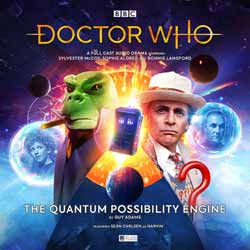|
Click here to return to the main site. Audio Drama Review
The Doctor and Ace are locked up. The TARDIS is gone. Things just couldn’t get any worse… could they? Of course they could! Things can always get worse – the new President of the Solar System, Josiah W Dogbolter, didn’t get where he is in life without learning that. That’s why he has a Quantum Possibility Engine. It’s a wonderful machine, creating a wonderful Solar System. And with this wonderful device, he can bring happiness and peace to all. Possibly. Either that, or tear the universe to shreds – it’s hard to be sure which... In between listening to and reviewing this Seventh Doctor audio, I’ve also been reading a Seventh Doctor graphic novel, Titan Comics’ Operation Volcano. This potentially confusing activity makes for an interesting comparison, because while the graphic novel seeks to emulate the television era of Sylvester McCoy (via the writing of Andrew Cartmel and the presence of Counter-Measures characters created by Ben Aaronovitch), The Quantum Possibility Engine is an audio drama that harks back to 1980s comic strips. The frog-like business tycoon Josiah W Dogbolter first appeared in the Fifth Doctor strip The Moderator, and quickly returned to face the Sixth Doctor in The Shape Shifter. Dogbolter and the Seventh Doctor later guest-starred in the Death’s Head comic book Time Bomb! The industrialist’s final chronological appearance to date was in the Twelfth Doctor strip The Stockbridge Showdown – but that hasn’t happened yet! Several of these strips also featured Dogbolter’s faithful robot servant Hob, who makes his audio debut here, voiced by Wayne Forester, alongside Toby Longworth, returning to the role of Dogbolter that he previously played in The Maltese Penguin. In common with The Maltese Penguin, The Quantum Possibility Engine is also comic in other ways. Since Longworth based his portrayal on Sydney Greenstreet’s character in the film The Maltese Falcon, Forester channels Peter Lorre for his performance as the obsequious Hob. I also enjoyed hearing the robot’s almost erotic pleasure as he inserted a data disk and analysed its contents, the sound of an old-school printer as he output a legal document, and his in-character reading of the end credits. The story’s final cliffhanger (the end of Part Three) is reminiscent of those from Delta and the Bannermen and Remembrance of the Daleks, with the Doctor basically vocalising what deep doo-doo he’s in! More satirically, the President got himself elected by telling the people what they wanted to hear, and his Quantum Possibility Engine allows him to rewrite ‘the truth’ about anything he may have done or said in the past. Sound familiar? He is matched in his obsession with public image by the Krasi, an alien (but American accented) race with whom he negotiates a trade deal. The Krasi are described by Coordinator Narvin (Sean Carlsen, reprising a character that originated in Big Finish’s Gallifrey series) as “forever representing themselves as misunderstood, heroic and benevolent”, and their Captain Regent (Jules de Jongh) always makes sure she records multiple versions of any statement she makes – very post-truth. Not every political reference is aimed at Donald Trump, though. Dogbolter also takes a moment to come over all Churchill as he appeals to the population’s patriotism. Writer Guy Adams’ plot turns in some unexpected directions. There’s a larger than usual role for Mel (Bonnie Langford), as her companions are first imprisoned and then find themselves leading alternate lives. Narvin and the Doctor end up in a working relationship not dissimilar to that between the bullying Biff Tannen and the timid George McFly at the start of Back to the Future. Meanwhile, Ace (Sophie Aldred) suddenly has a devoted boyfriend (Forester doing some completely undetectable doubling up) and proves to be a very good beat cop. Fortunately, Mel has some surprising tricks up her sleeve. For a brief time, it appears as though Dogbolter’s needs may buy the Doctor, Ace and Narvin their freedom – but it just lands them in even bigger trouble. The habit of characters talking to themselves, which can be a drawback of audio dramas, actually proves relevant to the plot in one light-hearted scene. This is not to say that The Quantum Possibility Engine is perfect. For one thing, Narvin doesn’t get much to do – the story would have worked just as well without him. Longworth’s doubling up in a couple of minor roles is fairly noticeable. Sombre incidental music (by Joe Kraemer) reused from Red Planets worked better in that context than it does here. On a more trivial note, the name of the piece feels more like a working title than a final one – my suggestion would have been something like Closed System, The Day of the Dogbolter or Time is Money (a motto embraced by the mogul in The Moderator). Nevertheless, there’s every (quantum) possibility that you’ll find this story worth spending your time and money on. 9 Richard McGinlay Buy this item online
|
|---|

